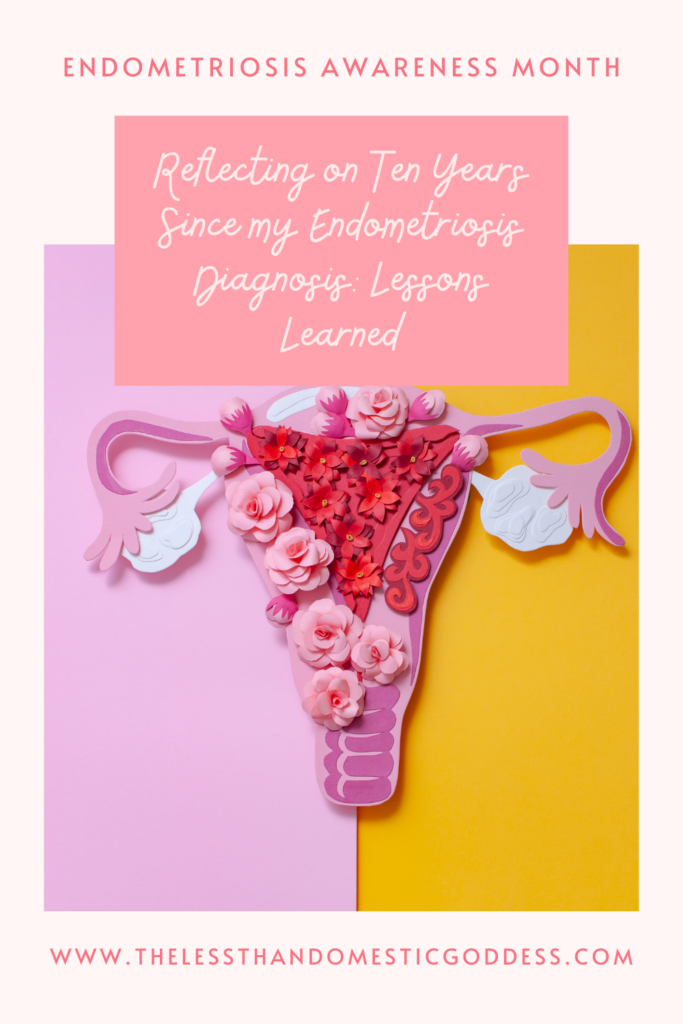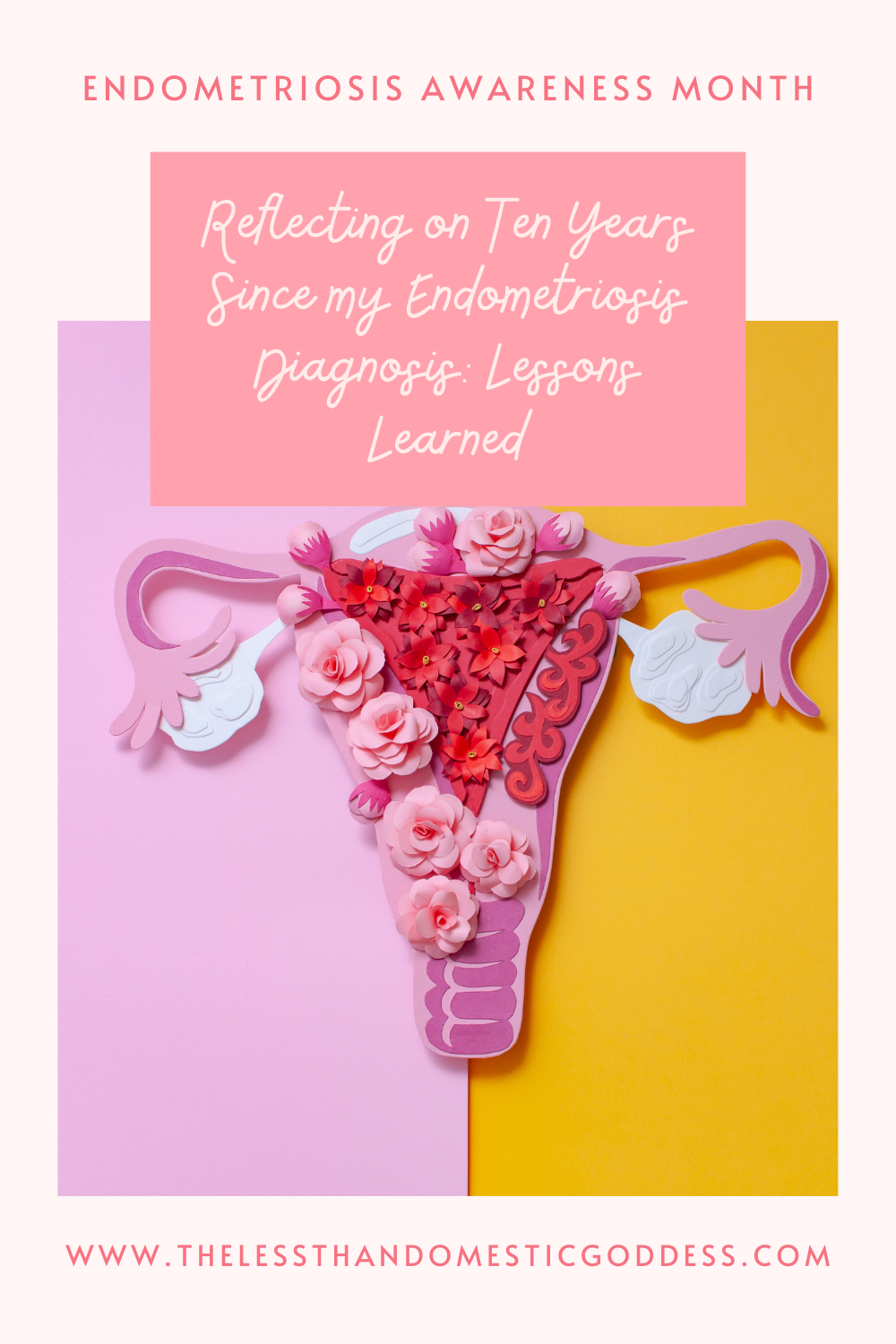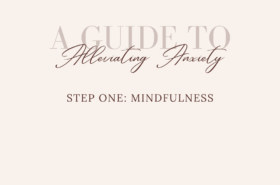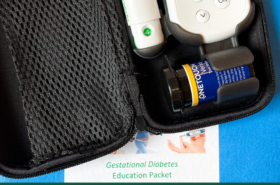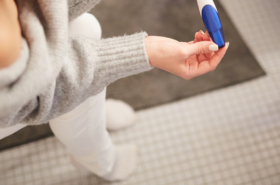It’s been ten years since my official endometriosis diagnosis back in 2011. I wanted to reflect on the last ten years and how living with endometriosis has changed me. If you’ve been here for awhile, you may have read the story of my diagnosis. For those who haven’t or are curious, I’ve included it below under “My Diagnosis Story”.
Reflecting on the Last Ten Years
Endometriosis has changed my life in many ways. I’ve spent a great deal of time in pain, fatigued, and/or feeling ill. Time spent in doctor’s offices. Time spent at pharmacies waiting for prescriptions. Time spent online researching how to feel better. Time spent implementing lifestyle changes in the hopes of alleviating my symptoms. Endometriosis has without a doubt worsened my issues with anxiety and depression. Physical health issues can definitely contribute to one’s mental health. I have learned that I operate best with a combination of therapy and medication. “Bad days” take me away from my family and my normal daily life. It is time I will never get back. I have had to make peace with where I am at in my health journey, as hard as that is at times.
Lessons from the past ten years…
Endometriosis has toughened me up and made me more resilient. I didn’t realize how strong I was until I didn’t have a choice but to face this condition head on.
Endometriosis has made me proactive about protecting and supporting my mental health. Today I have a much healthier outlook on life and have learned so much about who I am and how I react and respond to stressors.
Endometriosis has taught me that life isn’t fair and that our health and bodies can be fragile. We must honor ourselves. Our bodies do so much for us and should be treated kindly and gently.
Endometriosis has made me question doctors and traditional medical practices. It has made me less complacent and less likely to take a doctor’s word for it. It has made me curious and compelled to do my own research.
Having endometriosis has made me more grateful for the good days and the good moments.
I am grateful for modern medicine and science; for the ability and resources to pursue IVF. Without it, I wouldn’t have my beautiful daughter and another child on the way.
Endometriosis has made me more compassionate. It has made me more understanding of “invisible” illnesses and disabilities. You don’t know what is going on with someone based on first glance or impression. Try not to judge.
Endometriosis has made me want to be an advocate for women’s health.
My Diagnosis Story
I experienced endo symptoms for years prior to my diagnosis via laparoscopic surgery. I was written off by my doctors. They said I needed to go on birth control to solve my issues. I was experiencing painful long periods, spotting between periods, and digestive issues. They said it was normal for someone my age to have irregular periods and bad cramps. My digestive issues were chalked up to irritable bowel syndrome (IBS). This went on all throughout high school and college.
I had never heard of endometriosis and didn’t do much of my own research. I also never sought the opinion of a gynecologist. This was a big mistake. I stayed with my primary care physician when I should have insisted on a referral. My mother, grandmothers, and aunts (as far as I know) didn’t have endometriosis nor any known fertility issues. It wasn’t really something that was talked about openly. Painful periods were seen as a right of passage of women. I think deep down I knew something wasn’t right with my body, but chose to ignore it and live with the side effects I was experiencing.
After graduate school, I was in my mid-20’s and my periods quickly grew much worse. I was practically bedridden on the first three to four days of my period. I would wear extra large, overnight pads because I bled so much. I would take Advil and Tylenol around the clock to manage the painful cramps. My doctor eventually did refer me out. But, because she had no idea what was wrong with me, she sent me to a gynecological oncologist believing that I had cancer. I had a D&C and extensive testing performed and it was determined I did not have cancer.
Eventually my symptoms got so bad that it interfered with my daily life. I was so sick that I couldn’t really work full time and my anxiety was going through the roof. I didn’t know what was wrong with me, and I spiraled into a world of depression and anxiety. I was in my late 20’s and newly married when I started seeing a new gynecologist. My mom got a referral from our long time family doctor. This new gynecologist suspected endometriosis. It was the first time I heard that word. I was promptly booked for a laparoscopy.
I remember waking up groggy and disoriented after surgery. Someone told me that the surgery took hours longer than it was supposed to. They found endometriosis and lots of it. I was diagnosed with severe Stage III Endometriosis with endometriomas (chocolate cysts) in my ovaries. I had dozens of polyps as well. My doctor had removed as much endometriosis as she could, but she left the endometriomas alone. She knew that I wanted to preserve as much of my fertility as I could, and messing with endometriomas can lead to partial or full loss of ovaries.
While it felt good to finally receive a diagnosis and an explanation for my years of pain and suffering, I was left devastated. I had this chronic condition to contend with and I had no idea of next steps. My doctor advised me to get pregnant as soon as possible. I was scared of what my future would look like and also worried about my fertility. We immediately started looking for fertility doctors and clinics.
I dove head first into endometriosis research. I talked to other women on Twitter about their experiences. I read books and blogs. I changed my diet. I tried to remove as many toxins from our lives as possible. I exercised when my body allowed it. I did acupuncture. I drank some nasty herbal teas that left me nauseated. I took supplements and vitamins. Endometriosis became my obsession. I felt empowered and like I was gaining back some control after years of feeling so out of control with my body.
Everything I did not combat my endometriosis was an important stepping stone in helping to achieve a healthier lifestyle, but it wasn’t a cure. I will never stop researching or trying out new methods to combat my endometriosis, but I think it is important to manage expectations. There is no real “cure” for endometriosis. That is the harsh truth. It can be managed and there are new developments and treatments happening all the time.
As this post is getting rather lengthy, I plan to write a follow-up post including some of the newer research and treatments I’ve found including useful links and resources. I will also talk more about my experiences with infertility in relation to endometriosis.
Our shared experiences and stories are an important part of understanding endometriosis and how it impacts women’s lives. I continue to share for myself, current endometriosis survivors, and the future generation. I have a daughter who could one day be dealt the endometriosis card and I will do anything prevent her from going through what I went through. Endometriosis is talked about much more these days than back when I was looking for answers to my health concerns. I am hopeful that treatments will continue to get better. I am hopeful that women will seek treatment sooner rather than later. I am hopeful that IVF and infertility treatments will become more accessible and more readily covered by insurance.
